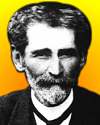 (source)
(source)
|
William Henry Hudson
(4 Aug 1841 - 18 Aug 1922)
English author, naturalist and ornithologist . His interest in nature started in his youth when he studied the local flora and fauna in Argentina (where he was born).
|
Science Quotes by William Henry Hudson (9 quotes)
As the proverb says, “You cannot fly like an eagle with the wings of a wren.”
— William Henry Hudson
In Afoot in England (1909, 1922), 80. He might have originated this specific wording, but as this full sentence shows, Hudson was quoting a proverb. Many sources simply attribute the quote to him. Yet, in fact, the expression goes back to at least 1607, for it appears in Thomas Walkington, 'To the Reader', The Optick Glasse of Humors as “I have soared also above my pitch, attempting an Eagles flight with the wing of a Wrenne.”
Have you ever observed a humming-bird moving about in an aerial dance among the flowers—a living prismatic gem that changes its colour with every change of position— … its exquisite form, its changeful splendour, its swift motions and intervals of aërial suspension, it is a creature of such fairy-like loveliness as to mock all description.
— William Henry Hudson
In Green Mansions: A Romance of the Tropical Forest (1916),
I am not a lover of lawns; … the least interesting adjuncts of the country-house. … Rather would I see daisies in their thousands, ground ivy, hawkweed, and even the hated plantain with tall stems, and dandelions with splendid flowers and fairy down, than the too-well-tended lawn.
— William Henry Hudson
In The Book of a Naturalist (1919), 337.
I have a friendly feeling towards pigs generally, and consider them the most intelligent of beasts, not excepting the elephant and the anthropoid ape—the dog is not to be mentioned in this connection. I also like his disposition and attitude towards all other creatures, especially man. He is not suspicious, or shrinkingly submissive, like horses, cattle, and sheep; nor an impudent devil-may-care like the goat; nor hostile like the goose; nor condescending like the cat; nor a flattering parasite like the dog. He views us from a totally different, a sort of democratic, standpoint as fellow-citizens and brothers, and takes it for granted, or grunted, that we understand his language, and without servility or insolence he has a natural, pleasant, camerados-all or hail-fellow-well-met air with us.
— William Henry Hudson
In The Book of a Naturalist (1919), 295-296.
It is perhaps a law of nature that when a species (or group) fits itself to a place not previously occupied, and in which it is subject to no opposition from beings of its own class, or where it attains so great a perfection as to be able easily to overcome all opposition, the character eventually loses its original plasticity, or tendency to vary, since improvement in such a case would be superfluous, and becomes, so to speak, crystallized in that form which continues thereafter unaltered. … [Such as] the humming-bird.
— William Henry Hudson
In The Naturalist in La Plata (1895), 40.
Our enmity to the serpent, which often exists together with a mythic and anthropomorphic belief in the serpent’s enmity to us, might be regarded as purely traditional, having its origin in the Scriptural narrative of man’s disobedience and expulsion from Paradise.
— William Henry Hudson
In The Book of a Naturalist (1919), 178.
The puma is, with the exception of some monkeys, the most playful animal in existence.
— William Henry Hudson
In The Naturalist in La Plata (1892, 1895), 40.
There are many Green Dragons in this world of wayside inns, even as there are many White Harts, Red Lions, Silent Women and other incredible things.
— William Henry Hudson
In A Traveller in Little Things (1921), 9.
When coming to close quarters with a skunk … one has to fear from an encounter; the worst is that effluvium, after which crushed garlic is lavender, which tortures the olfactory nerves, and appears to pervade the whole system like a pestilent ether, nauseating one until sea-sickness seems almost a pleasant sensation in comparison.
— William Henry Hudson
In The Naturalist in La Plata (1892, 1895), 116-117.
Quotes by others about William Henry Hudson (1)
Hudson is at his best about the greatest living English stylist ... Besides this he is the finest living observer, and the greatest living lover of bird and animal life, and of Nature in her moods.
Letter to A.A. Knopf, 4 Jan 1915.
See also:
- 4 Aug - short biography, births, deaths and events on date of Hudson's birth.
- William Henry Hudson: Life, Literature, and Science, by Felipe Arocena. - book suggestion.
 In science it often happens that scientists say, 'You know that's a really good argument; my position is mistaken,' and then they would actually change their minds and you never hear that old view from them again. They really do it. It doesn't happen as often as it should, because scientists are human and change is sometimes painful. But it happens every day. I cannot recall the last time something like that happened in politics or religion.
(1987) --
In science it often happens that scientists say, 'You know that's a really good argument; my position is mistaken,' and then they would actually change their minds and you never hear that old view from them again. They really do it. It doesn't happen as often as it should, because scientists are human and change is sometimes painful. But it happens every day. I cannot recall the last time something like that happened in politics or religion.
(1987) -- 


